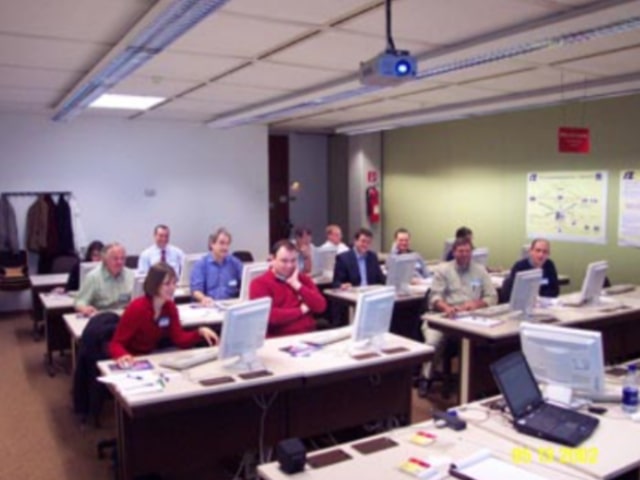Training and Consulting Services
Self-Training
We provide plenty of resources for free self-training on SuperPro Designer and SchedulePro. You may start by watching some of the videos on the videos page of our website. Next, we recommend that you study the examples that are of interest to you. SuperPro Designer is shipped with more than seventy thorough examples. Visit the SuperPro Designer Examples page for a brief description of the SuperPro examples. They all include detailed ReadMe files that describe the simulated process, the key results of the analysis and various advanced modeling concepts. SchedulePro is shipped with more than twenty thorough examples. Visit the SchedulePro Examples page for a brief description of the key SchedulePro examples. Each example comes with multiple SchedulePro files that represent various scenarios or cases of increasing complexity and a ReadMe file in PDF format that explains the cases and modeling concepts. For publications and presentation documents related to our tools, please visit the literature page of our website. If your organization does not own full licenses of our tools at the present, you could start your training with the functional trial editions that can be downloaded from the downloads page of our website.
Training Courses through the Web
We offer focused training courses through the web for a modest hourly fee. We typically devote 8-10 hours to SuperPro Designer and 4-6 hours to SchedulePro. The training is divided into multiple sessions each lasting 2-4 hours. These sessions are usually scheduled on different days to allow participants to practice independently and absorb more material between sessions. The training can be customized to focus on processes and modeling challenges relevant to your interests. A typical agenda for a course on both tools follows below. If you would like to schedule a training course for the members of your organization, please send an email to training@intelligen.com.
Technical Support
Technical support is provided via e-mail, telephone and through web meetings for license owners with an active maintenance contract. Our experts answer 95% of our users’ questions within 24 hours. Please direct your questions to TechSupport@intelligen.com.
Consulting Services
If your resources are stretched and you need extensive help for an urgent project, our applications engineers will be happy to help you. We can model and optimize your process and provide your team with advanced guidance on our applications. Our technical consultants have experience from a large variety of processes and industries. Please direct your inquiries to info@intelligen.com.
Agenda for a Course on SuperPro Designer and SchedulePro

The attendees of a course on both SuperPro and SchedulePro will learn how to:
- Model and evaluate batch and continuous processes.
- Perform planning and scheduling of batch manufacturing facilities.
- Calculate requirements for materials, labor, and utilities as a function of time.
- Size and estimate requirements for main equipment.
- Size and estimate requirements for auxiliary equipment, such as CIP skids.
- Size utility systems for batch and continuous manufacturing facilities.
- Perform cycle time analysis and debottlenecking studies.
- Perform capacity analysis studies.
- Estimate capital and operating costs.
- Assess and minimize the environmental impact of integrated processes.
SuperPro Designer – Topics Covered During a Training Course
- Component registration and their properties.
- Mixture registration and their properties.
- Flowsheet development.
- Initialization of operations and streams.
- Specification of scheduling links.
- Master-slave relationship for timing of events.
- Assignment of resources to operations (heat transfer agents, labor, auxiliary equipment etc.).
- Material and energy balances and visualization of results.
- Visualization of Gantt and equipment occupancy charts.
- Tracking of resources as a function of time.
- Concept of multiple cycles per batch for a procedure.
- Equipment staggering and its impact on cycle time of the overall process.
- The role of independently cycling procedures.
- Equipment sizing and cost estimation.
- Estimation of fixed capital investment.
- Estimation of operating cost and profitability analysis.
- The role of flowsheet sections in cost analysis.
- Databanks of the tool.
- Sharing of data through SuperPro’s database.
- Cycle time analysis and debottlenecking.
- Scale up/down calculations and process fitting.
- Sizing of batch utility systems (e.g., purified water system).
- Convergence of recycle loops and recycling in pull mode.
- Virtual energy recovery.
- Environmental impact assessment.
- Driving SuperPro through Excel to perform sensitivity analysis, process optimization and Monte Carlo simulation.
- Exporting of data to other tools (e.g., MS Project, SchedulePro, AutoCAD, Excel, etc.).
SchedulePro – Topics Covered During a Training Course
- Exporting of SuperPro recipes to SchedulePro.
- Overview of the interface and language of SchedulePro.
- Scheduling of campaigns and visualization of results.
- Saving data in the SQL Server database and visualization of results through the WebTracker.
- Rescheduling necessitated by delays and equipment failures.
- Creating recipes from scratch.
- Planning and scheduling of multi-product and multi-line facilities.
- Tracking of resources as a function of time.
- Sizing of utility systems for multi-product facilities.
- Concept of staff members, skills, and shift scheduling.
- Scheduling of maintenance activities.
- Inventory tracking and inventory-based scheduling.
- Concept of single and multi-level SKUs and their role in scheduling of multi-product facilities.
- Concept of SKUs in representing sequential synthesis of small molecule APIs.
- Capacity analysis of multi-product facilities.
- Stochastic modeling and Monte Carlo simulation.
- Bulk data import/export.


